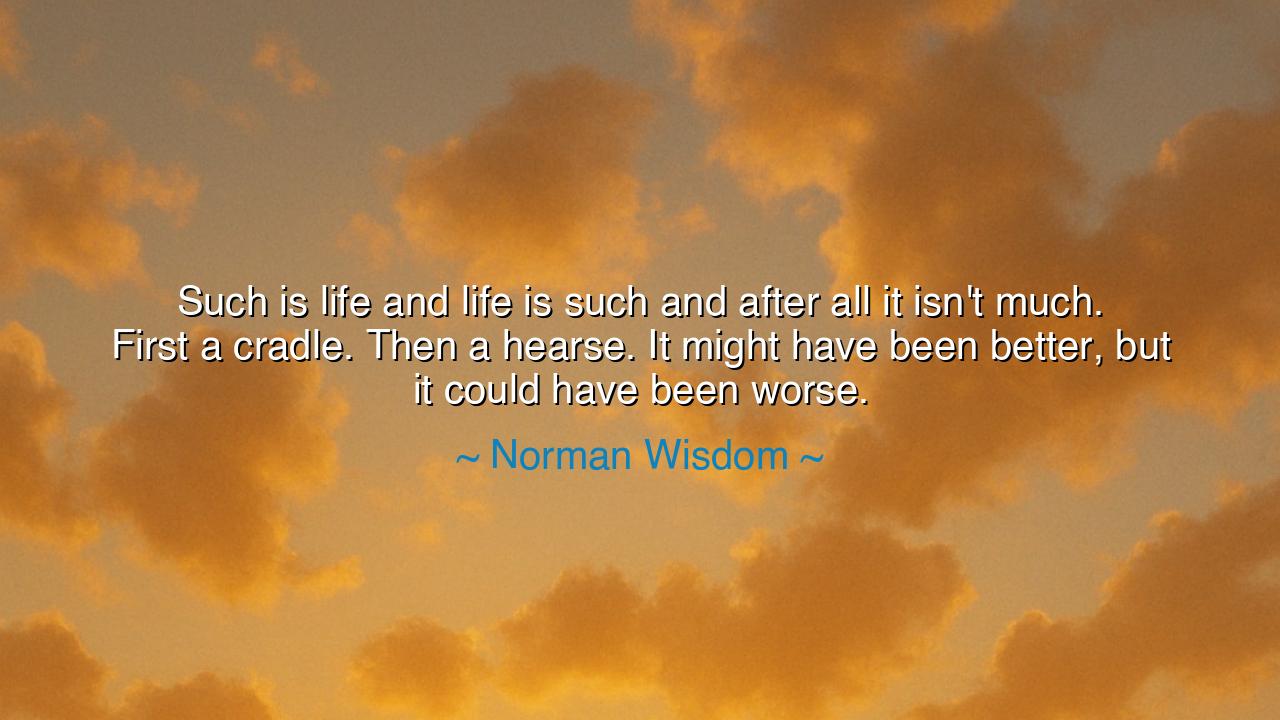
Such is life and life is such and after all it isn't much. First
Such is life and life is such and after all it isn't much. First a cradle. Then a hearse. It might have been better, but it could have been worse.






"Such is life and life is such and after all it isn't much. First a cradle. Then a hearse. It might have been better, but it could have been worse." These words from Norman Wisdom offer a poignant reflection on the fleeting nature of life, encapsulating the acceptance and resilience that define the human experience. Wisdom’s statement is a meditation on the brevity of existence, reminding us that life is a delicate balance between joy and sorrow, between beginnings and endings. In its simplicity, it speaks volumes about the nature of life, death, and human experience—a reminder that while we may wish for more, we must also find peace in what we have, for life, in all its imperfections, is a gift.
The ancients, too, understood this inevitable cycle of life and death. The Greek philosophers, especially Heraclitus, recognized that life is in a constant state of flux, a never-ending dance of opposites. He famously said, "You cannot step into the same river twice," symbolizing the ceaseless flow of life, where every moment is both an ending and a beginning. Socrates, in his last moments before drinking the hemlock, also acknowledged the transient nature of existence. He faced his death not with despair but with calm acceptance, reflecting on the life he had lived and the pursuit of virtue. For the ancients, life was not something to be controlled or predicted, but something to be embraced, knowing that its end was inevitable, but that in the living, we find meaning.
In a similar vein, Norman Wisdom's quote embodies the philosophy of stoicism, which teaches that we must face life’s challenges with equanimity. To understand that life is filled with both light and shadow, and yet still, it is worthwhile. Stoics like Epictetus taught that we cannot control external events, but we can control how we respond to them. Wisdom's statement is a modern echo of this ancient wisdom—an acceptance that life is not perfect, but it is still to be valued. We are born, we live, and we die; there is a cradle and there is a hearse. But between these two points lies the fullness of life—its joys, its struggles, its triumphs, and its heartbreaks. The key is to accept what is, and find contentment in the present moment.
The same message can be seen in the life of Leonidas, the Spartan king who chose to face certain death at the Battle of Thermopylae. He and his warriors knew the odds were against them, yet they chose to fight not for the victory, but for the honor of standing firm in the face of overwhelming adversity. Leonidas could have retreated and lived, but instead, he chose to embrace his fate. In doing so, he showed the world that while life may be short, the way we live—and how we face the inevitable end—matters more than anything else. This aligns perfectly with Wisdom’s sentiment: life is fleeting, it may have been better, but it could have been worse, and in our acceptance of its impermanence, we find peace.
In our own lives, we face many hardships, disappointments, and losses, often wishing for a better outcome. Yet, like Norman Wisdom suggests, we must learn to see life for what it is—unpredictable, full of highs and lows, but worth living nonetheless. The moment we are born is also the beginning of the end, and while it may seem morbid to reflect on death, such contemplation brings clarity to how we should live. Gratitude, acceptance, and resilience are key to finding joy in the fleeting moments we are granted.
We must look to the past, and the examples of great men and women, to remind us that life is to be lived with a sense of purpose and gratitude. The courage to face our own mortality, and the wisdom to accept that life may never be all that we wish, but it is still precious, can bring us peace. Just as the ancient Stoics did, we too must train ourselves to embrace life’s imperfections and find meaning in what we have rather than lamenting what is missing. The strength of our character lies not in how much we accumulate, but in how we respond to the trials and tribulations life throws our way.
Thus, let us remember Norman Wisdom’s words as a guiding light for living a fulfilled life. Let us find contentment in our own journey, knowing that while life may not always be what we desire, it is still a gift. The cradle and the hearse remind us of the inevitability of our journey. But it is what we do in the space between that truly matters. So, let us live with gratitude, purpose, and acceptance, recognizing that life’s fleeting nature does not make it any less valuable.






AAdministratorAdministrator
Welcome, honored guests. Please leave a comment, we will respond soon